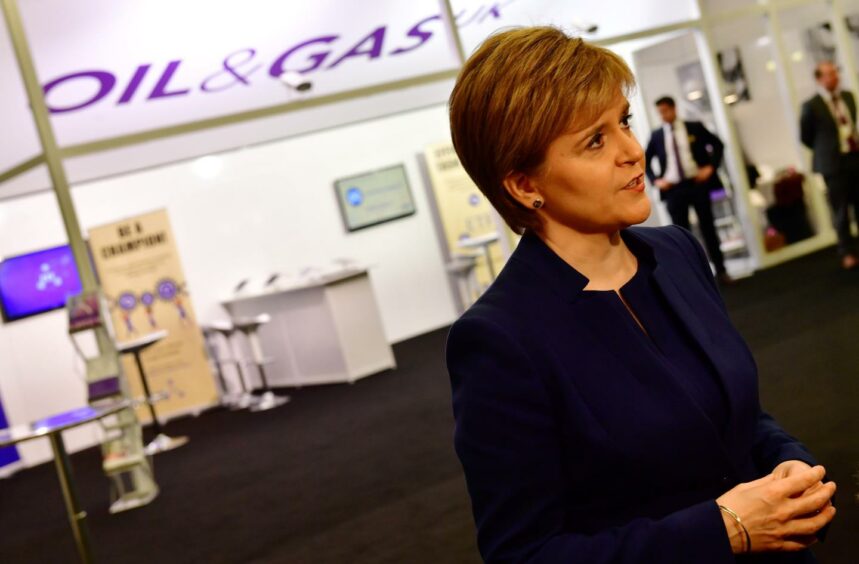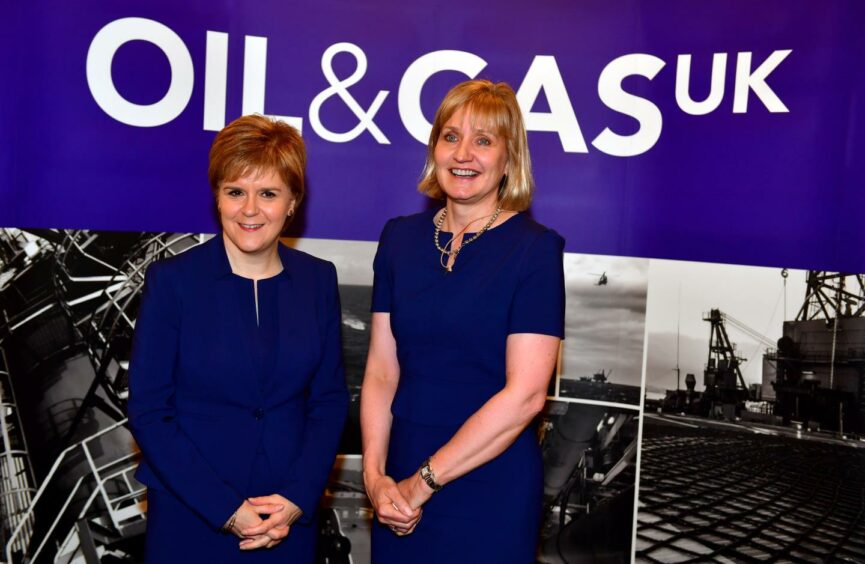
Nicola Sturgeon insists mistakes of the past “won’t be repeated” as she tackles criticism of the SNP’s long-term support for oil and gas workers.
The first minister is under pressure to show how thousands of jobs will be safeguarded in the push to move away from fossil fuels to a greener future.
She has already stated her opposition to new exploration, including the Cambo oil field off Shetland.
Ms Sturgeon says leaders need to shoulder responsibility in the fight against a global climate emergency.
But she faced claims the government has failed to set out a comprehensive plan to replace the economic foundation of the oil-reliant north-east.
The SNP leader has also drawn calls from her own party’s ranks to keep the industry alive while the renewables sector is catching up.
Ms Sturgeon told us she is determined to give workers a fair deal in the move to low-carbon energy and jobs.
“Let me be crystal clear about my commitment to supporting the industry make the transition that is needed and to securing jobs in the region for the long-term,” she writes in an exclusive article in Energy Voice’s sister publication, the Press & Journal.
“My government is focused on achieving the fastest possible just transition for the oil and gas sector – one that delivers jobs and ensures our energy security, as well as meeting our climate obligations.
“We will not allow the mistakes of the past to be repeated. Indeed, far from deserting the sector, we are already investing in its net-zero transformation.”
Deirdre Michie, chief executive of industry Oil and Gas UK, welcomed the Ms Sturgeon’s comments.
She said: “The First Minister’s pledge to provide long-term support for oil and gas workers is clear recognition that our industry plays a vital role in the UK’s transition to a low carbon future. Real change is happening today and the people in our industry are already using their skills and expertise to drive the changes we need to deliver the diverse energy mix of the future.
“Indeed, our industry was one of the first sectors to commit to helping the country achieve its climate obligations of net-zero emissions by 2050 and 2045 in Scotland with its Roadmap 2035, and the North Sea Transition Deal, agreed in March, is a compelling example of how this country is driving climate leadership.
“We need to continue working together with governments to deliver a transition at pace, that cuts emissions, prioritises security of UK energy supply, reducing our reliance on imported energy and supporting the oil and gas people and companies already driving change.”
The first minister had been preparing to attend an event in Aberdeen marking the next step in the development of the Energy Transition Zone. However, it was rescheduled because of uncertainty surrounding the Omicron strain of coronavirus.
The ETZ project is backed with £56m funding from the Scottish and UK governments. It aims to make the region one of the most attractive locations in Europe to develop and accelerate low carbon energies.
North-east reliance on oil and gas
Last week, we highlighted the scale of the project in an interactive map showing how the jobs and wealth are distributed beyond the region across Scotland and the wider UK.
Oil and gas supports 71,000 jobs across Scotland, according to industry figures.
The vast proportion of these jobs – more than 65,000 – are based across Aberdeen and Aberdeenshire.
It was worth more than £19 billion to the country in terms of value added from goods and services.
Some of Ms Sturgeon’s policy critics came from within the SNP, including her former SNP press chief and election candidate Fergus Mutch.
He said opposition to new drilling before reducing demand “puts the cart a country mile in front of the horse”.
Concerns include the lack of detail about how high-value wages can possibly be replaced.
There are also fears turning off the taps too soon will make the country more reliant on imports, including from Russia.
On Friday, former first minister Alex Salmond also spoke out with damning claims Ms Sturgeon had “kicked the north-east in the teeth”.
In an angry broadside at his former ally, Ms Salmond claimed the SNP leader was indulging in “student politics that sacrifices and jeopardises the livelihoods of tens of thousands of Scots”.
Ms Sturgeon said the need to reduce reliance on fossil fuels must accelerate.
In her exclusive article, the first minister writes: “I firmly believe that by working together, we can ensure a prosperous and sustainable future for this and future generations – both in the north-east and beyond.”
As part of that plan she highlighted an expanded £75m energy transition fund and the first £20m from a “just transition fund” in the north-east.
In the next decade the Scottish Government expects to see a 10-fold increase in installed offshore wind capacity.
And in spring, Ms Sturgeon will set out a refreshed energy strategy on how the economic social impacts of the upheaval will be managed.
The first minister also aims criticism at the UK Government for failing to give the region a kick-start in developing carbon capture storage.
The Conservatives at Westminster overlooked a major scheme at St Fergus in Aberdeenshire, given first-round support to schemes in England instead.
Recommended for you

 © Supplied by DCT Media
© Supplied by DCT Media